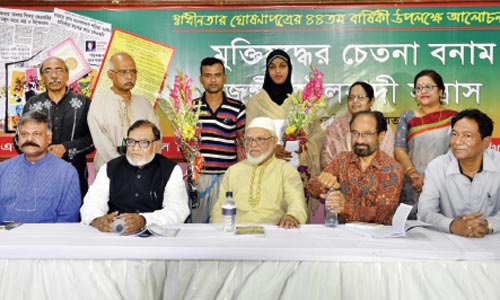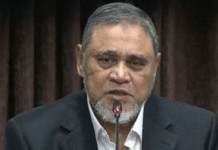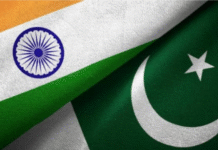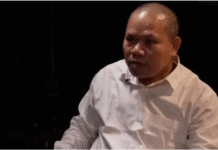Legal experts and security analysts and freedom fighters on Friday strongly condemned the United Nation’s plea to halt the execution of death sentence to war criminal Mohammad Kamaruzzaman.
They said that the UN in no way could make such appeal to the Bangladesh authority as the war crimes trial was being held in Bangladesh as per international law, but the execution of the verdict must follow the country’s own law.
In a discussion at the auditorium of Women’s Voluntary Association in Dhaka in the afternoon, they also said that the UN was showing double standards by urging all to stop crimes against humanity and at the same time making plea to stop trial of the crimes against humanity.
Spokesperson for the UN High Commissioner for Human Rights Ravina Shamdasani, at a press briefing in Geneva on Thursday, urged Bangladesh to halt the execution of war criminal Mohammad Kamaruzzaman.
She said the trial of Kamaruzzaman in an International Crimes Tribunal in Bangladesh was reportedly rife with irregularities and did not meet international fair trial standards.
National Human Rights Commission chairman Mizanur Rahman, addressing the discussion, termed the war crimes trial ‘internal matter’ of a country and said that the UN could not intervene into any internal matter of a country.
He said Bangladesh has all rights to execute the death sentence as per the existing laws.
Mizanur, also a law teacher, said that the UN could initiate a debate on whether the death sentence should be stopped, but they could not appeal to any country to stop a death sentence before a ban on death sentence internationally.
He praised the trial process of Bangladesh’s International Crimes Tribunal and said the process under which the trial of war criminals was being held in Bangladesh would redetermine the international standard to hold trial of war criminals in future.
Retired Major General Md Abdur Rashid, who is a strategic and security analyst and executive director of Institute of Conflict, Law and Development Studies, questioned the authority of the UN to make such statements on the execution of a verdict handed down to anybody in a country.
Ekattorer Ghatak Dalal Nirmul Committee organised the discussion on ‘spirit of liberation versus religious extremism and militancy’ to mark the 44th anniversary of Proclamation of Independence, which was made on this day in 1971 by the Mujibnagar government.
Abu Osman Chowdhury, who was the commander of sector 8 of the Bangladesh forces during the liberation war in 1971, presided over the discussion, addressed, among others, by the liberation war affairs minister AKM Mozammel Haque and senior lawyer Amir-Ul Islam, who drafted the Proclamation of Independence.
In the discussion, Ekattorer Ghatak Dalal Nirmul Committee awarded Labonya, a hijra (a member of the transgender community) and van driver Rafique for their heroic role in catching two of the killers of blogger Oyasiqur Rahman while they were fleeing from the scene.
They said that the UN in no way could make such appeal to the Bangladesh authority as the war crimes trial was being held in Bangladesh as per international law, but the execution of the verdict must follow the country’s own law.
In a discussion at the auditorium of Women’s Voluntary Association in Dhaka in the afternoon, they also said that the UN was showing double standards by urging all to stop crimes against humanity and at the same time making plea to stop trial of the crimes against humanity.
Spokesperson for the UN High Commissioner for Human Rights Ravina Shamdasani, at a press briefing in Geneva on Thursday, urged Bangladesh to halt the execution of war criminal Mohammad Kamaruzzaman.
She said the trial of Kamaruzzaman in an International Crimes Tribunal in Bangladesh was reportedly rife with irregularities and did not meet international fair trial standards.
National Human Rights Commission chairman Mizanur Rahman, addressing the discussion, termed the war crimes trial ‘internal matter’ of a country and said that the UN could not intervene into any internal matter of a country.
He said Bangladesh has all rights to execute the death sentence as per the existing laws.
Mizanur, also a law teacher, said that the UN could initiate a debate on whether the death sentence should be stopped, but they could not appeal to any country to stop a death sentence before a ban on death sentence internationally.
He praised the trial process of Bangladesh’s International Crimes Tribunal and said the process under which the trial of war criminals was being held in Bangladesh would redetermine the international standard to hold trial of war criminals in future.
Retired Major General Md Abdur Rashid, who is a strategic and security analyst and executive director of Institute of Conflict, Law and Development Studies, questioned the authority of the UN to make such statements on the execution of a verdict handed down to anybody in a country.
Ekattorer Ghatak Dalal Nirmul Committee organised the discussion on ‘spirit of liberation versus religious extremism and militancy’ to mark the 44th anniversary of Proclamation of Independence, which was made on this day in 1971 by the Mujibnagar government.
Abu Osman Chowdhury, who was the commander of sector 8 of the Bangladesh forces during the liberation war in 1971, presided over the discussion, addressed, among others, by the liberation war affairs minister AKM Mozammel Haque and senior lawyer Amir-Ul Islam, who drafted the Proclamation of Independence.
In the discussion, Ekattorer Ghatak Dalal Nirmul Committee awarded Labonya, a hijra (a member of the transgender community) and van driver Rafique for their heroic role in catching two of the killers of blogger Oyasiqur Rahman while they were fleeing from the scene.
Source: New Age










